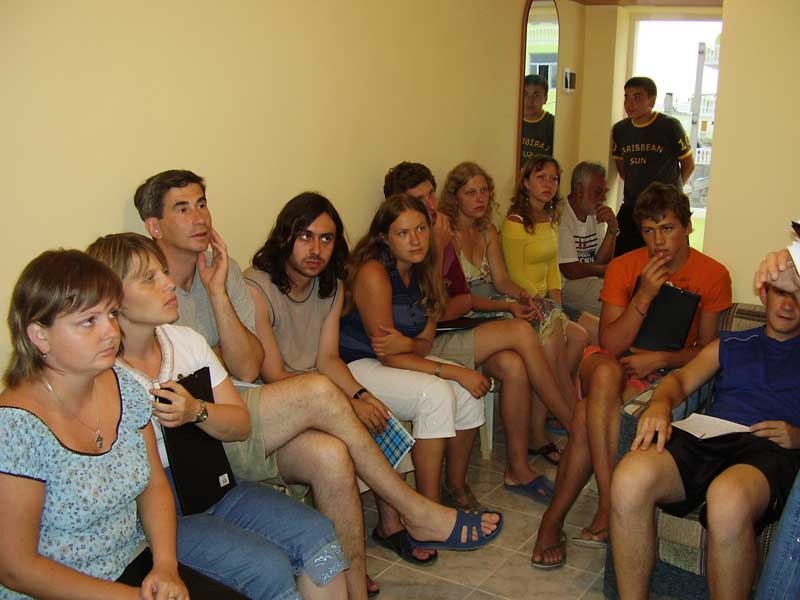Living History of the Testimonies All-Ukrainian Field Summer School on Holocaust Studies took place in the Crimea
 The participants of the all-Ukrainian Field Summer School “The Holocaust through the Eyes of the non-Jewish Population (Russians, Ukrainians, Crimean Tatars) on the Example of the Crimean Peninsula” attempted at recreation of the tragic pictures of the WWII in the Crimea basing on the witness’ statements. Field research by the associates of the Crimean Ethnographic Museum, university students, and senior high school students was done at August 4-12th, 2006 in Krasnogvardeyskiy region (former Kurman-Kemeltchinskiy) and Razdolnoye village (former Ak-Sheikh), where before the War lived a large Jewish population and existed Jewish national kolkhozes.
The participants of the all-Ukrainian Field Summer School “The Holocaust through the Eyes of the non-Jewish Population (Russians, Ukrainians, Crimean Tatars) on the Example of the Crimean Peninsula” attempted at recreation of the tragic pictures of the WWII in the Crimea basing on the witness’ statements. Field research by the associates of the Crimean Ethnographic Museum, university students, and senior high school students was done at August 4-12th, 2006 in Krasnogvardeyskiy region (former Kurman-Kemeltchinskiy) and Razdolnoye village (former Ak-Sheikh), where before the War lived a large Jewish population and existed Jewish national kolkhozes.
The Summer school was organised by Ukrainian Centre for Holocaust Studies (director Anatoly Podolsky). The author and manager of the project is Tatyana Velichko, postgraduate student of the Institute for Arts, Folklore, and Ethnology of NAS of Ukraine. “Unfortunately, there are few protagonists of Oral history method in Ukraine, that is why our Summer school became an important stage in qualifying specialists for the future work in the field. Usual history methods only when combined with oral history can give the general picture. – notes Tatyana Velichko. – because Jewish kolkhozes and neigbouring areas had polyethnic surrounding: Russians, Ukrainians, Crimean Tatars, Germans etc. – we were especially interested in their perception of the Holocaust and inter-ethnic relations of the pre-war period”.
Stories of the local dwellers-witnesses to those events made it possible to find one more place of execution of Jews in times of WWII in Bashennya str in Razdolnoye village. The place is now occupied by water tower. Besides the statements about the tragedy of Jews, participants gathered information about another great tragedy – deportation of the Crimean Tatars in May 1944; and even some information about deportation of Crimean Germans.
Publication of the collection of the gathered data is planned.
Announcements
MoreLatest News
-
New section #PhotoHistory on our social network
The Ukrainian Center for Holocaust Studies has launched a new section on its official Facebook page, Photo_History, where we remind participants of the Center's projects of important and memorable moments of our research and teaching activities and collect feedback, reflections, and memories of these projects from different years.
[More] -
Raihorod and Sobolivka: the Life and Death of Jewish Communities
Raihorod and Sobolivka: the Life and Death of Jewish Communities/ Natalia Derevyanko. — Kyiv : Ukrainian Center for Holocaust Studies, 2023. — 137 p.
[More] -
HAPPY INDEPENDENCE DAY OF UKRAINE!
Dear friends and colleagues, happy Independence Day of Ukraine!
This holiday has always been a symbol of national pride, unity and freedom for us. But today, when our country is going through one of the most difficult periods in its modern history, this holiday has taken on even greater importance. The price we pay for our desire to live in dignity in a united, independent and successful European state is extremely high.
[More] -
THE ANNUAL EDUCATIONAL SEMINAR-SCHOOL "THE HISTORY OF THE HOLOCAUST IN UKRAINE: RESEARCH, EDUCATION, COMMEMORATION"
The Ukrainian Center for Holocaust Studies, in cooperation with the Yad Vashem Memorial (Jerusalem), held an annual seminar-school the History of the Holocaust in Ukraine: Research, Education, Commemoration.
[More] -
Presentation of the project "Bykivnia, Babyn Yar, Bucha - Between the massacre and memory about it".
Today, it is important not only to compare the crimes of the three dictatorial regimes, but also to explain their nature, under what circumstances there is a real possibility of mass murder and its justification. This project shows that it is possible and worthwhile to compare the two totalitarian regimes of the twentieth century without diminishing the memory of either of them, and that it is also worth analysing Ruscism in the context of communism and Nazism.
[More]




